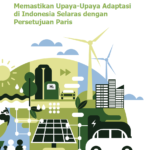In 2023, the Sixth Assessment Report (AR6) of the Intergovernmental Panel on Climate Change (IPCC) shows that anthropogenic greenhouse gas emissions (GHG) is responsible for a global temperature increase of 1.1°C. The report also projects that in the coming decades, the impacts of climate change, such as extreme weather, heat waves, heavy rainfall, drought, tropical cyclones, melting glaciers, and sea level rise, will increase significantly, both in terms of intensity and frequency. As stated in Article 2.1(b) of the Paris Agreement, one of the Paris Agreement objectives is to increase the ability to adapt to the adverse impacts of climate change and foster climate resilience and low GHG emissions development in a manner that does not threaten food production. This paragraph entails that climate actions are not merely about keeping the temperature increase below 1,5oC, but also to cope with the impacts of climate change by increasing climate resilience.
Indonesia Research Institute for Decarbonization (IRID) views the importance of adaptation measures, to have equal footing as mitigation measures, including in Indonesia. A discussion was then held on 29 May 2024 on “Aligning Indonesia’s Adaptation Measures with the Paris Agreement”.
Several key issues emerged from the discussion are as follow:
Challenges
“One of the initiatives that has been developed by the Ministry of Energy and Mineral Resources (MEMR) is the “Patriot Energy” program. The program consists of sending out competent young people in renewable energy issues, to assist communities in 3T (Disadvantaged, Frontier, and Outermost) areas of Indonesia. This program aims to increase the community’s understanding on renewable energy, so they can actively involved in managing the potential renewable energy sources in their areas.
This is important, to ensure that local communities participations are existed throughout the pre-feasibility study, installation and maintenance phases. It is expected that by increasing their understanding, will help them to manage the existing renewable energy facilities particularly in their area.
The role of local governments is equally crucial in the energy sector; recalling that although most of energy policies are developed at the national level, but the implementation will require the involvement of local actors. Therefore, it is important for both the central and local government to align their existing policies, as well as with the local potential that can be further developed.“
Share:





